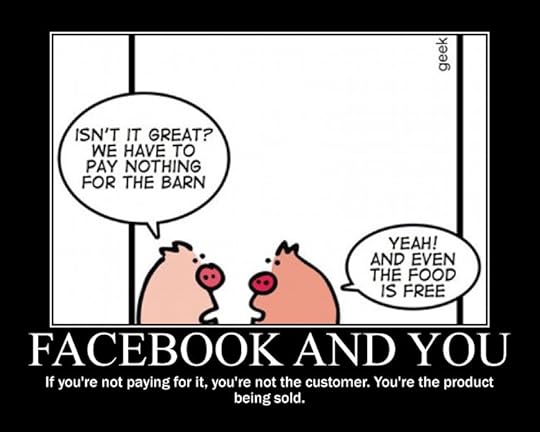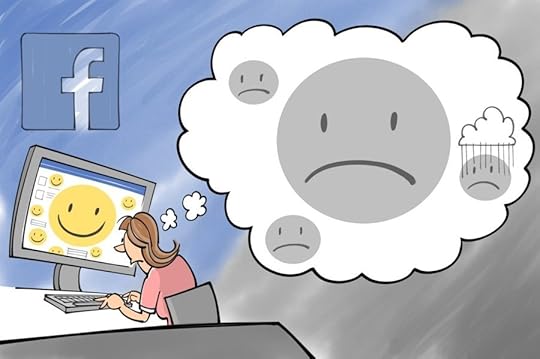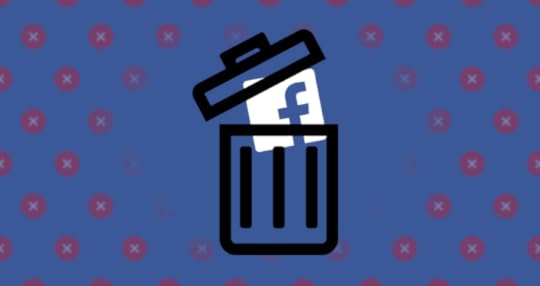#DeleteFacebook - My Product Recall

In the immortal words of Andrew Lewis (a.k.a., blue_beetle), "If you are not paying for it, you're not the customer; you're the product being sold." Most of us realized this, at least on some level, when we joined Facebook. If we're paranoid, we try to lock our privacy settings down as tightly as possible. We're careful about what we share, and how widely. We avoid posting information that is too sensitive or personal. We tell ourselves that it's a worthwhile tradeoff: we can keep track of geographically dispersed friends and family, stay in touch across the miles and time zones. We're members of a vast online community, a global village growing in cyberspace beyond its original creator's wildest imaginations.
Then the Cambridge Analytica revelations come along to slap us in the face, and we wake up to realize where we really are.
As somebody who works in cybersecurity for my day job, I've had reservations for a while. But authors are exhorted to maintain an active social media presence, to "build our platform." There can be value in that, certainly. Social media offers wonderful potential to connect with an audience for all kinds of writers, artists, craftsmen, and small businesses. But, like everything in life and on the internet, it has its darker side.
I have a relative who was "Facebook-stalked" by her abusive ex... to the point where he gleaned enough intel to track her down in the real world. Unfortunately, her experience is not unique.
Burglars have for years been using Facebook to target victims, casing those targets who post purchases of valuable items and striking when they know (via "location posts") that the victim isn't home. Worse, the platform has been abused to lure, kidnap, and traffic children.
Beyond the baldly criminal and nefarious, Facebook has been shown to have a more insidious, but far wider, effect on millions of its subscribers. It presents a carefully crafted, "curated" image of others' lives, and a stress-inducing pressure to respond to every post or comment to avoid becoming a "social exile." The result? A series of studies have confirmed that the more you use Facebook, the worse you feel.

For me, Cambridge Analytica was the last straw. In cybersecurity, we're quickly taught that most cybercriminals use social engineering to trick users into letting them in the door so they can loot the digital assets. In other words, in the vast majority of cases, bad guys don't hack the systems; they hack the people. Now shadowy "social data scientists" are exploiting weaknesses in Facebook's user targeting algorithms and APIs to hack massive numbers of people for their own financial benefit... or to serve their clients' hidden agendas. They use our private online profiles to identify our fears, our phobias, our likes and dislikes so they can manipulate us with precise disinformation. They call it personality profiling. It's social engineering. They're mind-hackers. And -- if you're an active Facebook member -- you're inadvertently letting them inside your skull.
Creepy and hyberbolic, eh? I can appreciate that reaction. I have many friends and family who continue to use and enjoy Facebook. They're smart people, and I respect their choice. I just decided, based on the preponderance of evidence, to make a different one.
I pulled the digital trigger. I did in fact delete my Facebook account. It may be mostly a symbolic gesture, but fiction writers know full well that symbolism carries weight. Do I have second thoughts or regrets? Sure, a few. But in the world of social media, where I'm the product, I exercised my right to a personal product recall. And I'm glad I did.

#SFWApro
Published on April 15, 2018 09:16
No comments have been added yet.
Work in Progress
Random musings from a writer struggling to become an author.
- Brian Burt's profile
- 51 followers



